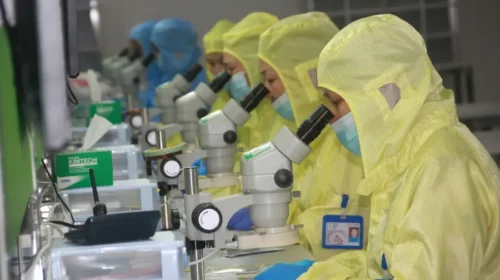Investors pile into CANbridge stock but can the rally last?

The maker of drugs for rare diseases has enjoyed an explosive rise in its share price, helped by a partnership deal and Chinese moves to widen access to costly therapies
Key Takeaways:
- A drug distributor bought an equity stake in the company as part of a strategic cooperation agreement, easing CANbridge’s cash flow woes
- Even with increased prospects in China, the drug producer needs to target overseas markets to boost its revenue potential
By Molly Wen
Hong Kong has been leading the world this year for investment returns on makers of novel drugs.
The HKEX Innovative Drug Index has soared 113% in 2025, far outpacing gains by the Nasdaq Biotechnology Index and the pharmaceutical stocks listed in mainland China.
And the standout performer among the Hong Kong-listed firms is CANbridge Pharmaceuticals Inc. (1228.HK), a company specializing in treatments for rare diseases.
Its stock price surged from HK$0.136 at the end of May to an intraday high of HK$2.30 on August 14, a leap of 1,591% in just two and a half months. The rally took the firm’s market value from under HK$100 million ($12.82 million) to more than HK$900 million.
Three factors propelled the explosive rise. In May the firm gained regulatory approval for a treatment for Gaucher disease, a rare genetic condition causing a fatty build-up in the body, with the first prescription for the drug issued in July. Then in August three of its products passed a preliminary review on the way to being covered by commercial medical insurance, enhancing their commercial prospects. Meanwhile, a sale of shares to drug distributor Qingdao Baheal Medical Inc. (301015.SZ) in a private placement eased the company’s cash flow difficulties.
The rally accelerated over four trading sessions from August 7 to 13, with daily gains of 7.07%, 27.36%, 23.7% and 25.75%, fueled by news of the strategic cooperation deal with Baheal Medical. CANbridge sold HK$100 million worth of shares at HK$1.34 per share to its partner, equivalent to around 17.65% of shares issued up to that point, leaving the buyer with around 14.99% of the expanded equity.
Baheal Medical provides branding, distribution and retail services for drug makers, with Big Pharma clients including Roche, AstraZeneca and Astellas. Under the agreement, it gained exclusive rights to promote some of CANbridge products in mainland China, Hong Kong, and Macao. Affiliates of Baheal Medical may also serve as distributors in these markets.
CANbridge said the equity deal would enhance its commercial capability and accelerate market penetration for its products. Equally, though with less fanfare, the move has eased an acute cash flow crisis. CANbridge revenue fell 17.3% last year to just 85.10 million yuan ($11.9 million), while the company’s annual net loss swelled 16.84% to 443 million yuan, leaving just 10.5 million yuan in available cash by year-end.
High costs for a limited market
Having scored breakthroughs in treating rare diseases, and with three products already approved, why is the company under financial strain? Rare conditions, by definition, affect a limited number of patients, capping the market for the new drugs.
High R&D costs tend to make the drugs expensive. But China’s healthcare insurance system prioritizes coverage for common diseases, limiting the scope for reimbursing the costs of therapies for less pervasive maladies.
CANbridge’s newly approved injectable therapy for Gaucher disease is a case in point. The enzyme replacement drug, marketed under the brand name Gaurunning, is the first to be developed in China and comes in at half the price of imported treatments costing a million yuan a year per patient. But with just 3,000 Gaucher patients in China, the revenue ceiling remains low.
However, China is taking steps to make such treatments more affordable for patients. On August 12, three CANbridge products including Gaurunning were included in a preliminary list of innovative drugs that could become eligible for supplemental private insurance beyond the basic state medical coverage.
The selection featured for the first time in national drug talks this year, as a means of improving public access to otherwise expensive drugs and fostering pharmaceutical innovation. The two other CANbridge products that made it onto the commercial catalogue were Hunterase, an enzyme therapy for metabolic disorders, and Livmarli for a condition caused by excessive bile in the liver.
While China works on facilitating treatments for rare conditions, CANbridge is setting its sights on global markets, with plans to seek a wider pool of potential patients for its treatment for Gaucher disease.
CANbridge currently trades at a price-to-sales (P/S) ratio of approximately 8.4 times, compared with 23 times for RemeGen (9995.HK; 688331.SH), another biotech focused on treatments for rare conditions. Even with the latest rally, the CANbridge stock is around 80% below the company’s 2021 IPO price.
Some investors may be betting on the chances of more blockbuster deals to inflate the share price. But the rare disease sector still carries systemic risks, notably limited patient numbers and high costs, that could threaten to burst the bubble.
To subscribe to Bamboo Works weekly free newsletter, click here




